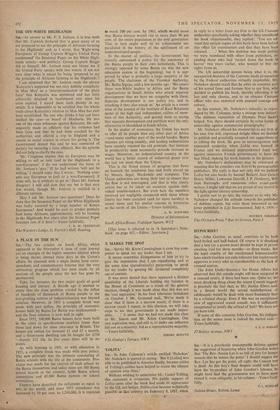A PLACE IN THE SUN
SIR,—The two articles on South Africa which appeared in the November 6 issue of your journal
are an example of the highly selective interest which is being shown abroad these days in the Union's affairs. So obsessed with a single theme have corre- spondents and commentators become that the very substantial progress which has been made by all sections of the people since the war has gone by unobserved.
Take, for instance, the two major goals of good housing and literacy. A decade ago it seemed to many that the slum problem created by the influx of hundreds of thousands of Bantu people to the fast-growing centres of industrialisation was beyond solution. However, in 1951 a complete break was made with past policy, the principle of economic homes built by Bantu for Bantu was implemented— and the final solution is now well in sight.
Since 1955, 100,000 Bantu houses have been built in the cities to specifications nowhere lower than those laid down for slum clearance in Britain. The homes are rented for between it and ES a month, and a three-room dwelling can be bought for £250 —deposit i12 10s. In five years there will be no slums.
As with housing in 1951, so with education in 1953, a complete break was made with past policy. The new principle was the intimate associating of Bantu schools with the life of the community. Pro- vision was made for the control of each school by the Bantu themselves, and today there are 500 Bantu school boards in the country, 4,000 Bantu school committees and 45,000 Bantu parents on school committees.
Experts have described the syllabuses as equal to any in the world; and since 1953 attendance has increased by 50 per cent. to 1,240,000. It is expected to reach 100 per cent. by 1963, which would mean that Bantu literacy would rise to more than 90 per cent. of the entire population in the next generation. That in turn might well be an achievement un- paralleled in the history of the upliftment of an underdeveloped people.
In the matter of politics, the Government has recently announced a policy for the autonomy of the Bantu people in their own homelands. This is strongly opposed by some Bantu (as was the new education system in the beginning), but it is sup- ported by what is probably a large majority of the people. The chairman of the Transkei Authority, Mr. Botha Sigcau, said a few months ago: 'We assure those non-White leaders in Africa and the Bantu organisations in South Africa who attack separate development that we have no sympathy with them. Separate development is our policy too, and in attacking it they also attack us.' An article in a recent issue of the journal of the Institute of Race Relations spoke of the high and independent calibre of mem- bers of this Authority; and quoted them as saying that separate development and partition were the only alternative to bloodshed in South Africa.
In the matter of economics, the Union has more to offer all its people than any other part of Africa —and many another part of the world besides. Bantu incomes are rising steadily, and leading industrialists have recently rejected the old principle that increase in productivity must necessarily precede increase in wages. Moreover, no industrialised country in the world has a better record of industrial peace over the last ten years than the Union.
This is the broad stream of progress that flows on beneath the incidental fuss and froth stirred up by Messrs. Segal, Mackenzie and company. The Union authorities are doing their best to ensure that the flow is not interrupted, and that is why timely action has to be taken on occasion against indi- vidual trouble-makers. But even here the numbers involved are negligible compared with those whose liberty has been curtailed (and far more harshly) in recent times and for similar reasons in territories to the north of the Union.—Yours faithfully, A. W. STEWARD Director of Information South Africa House, Trafalgar Square, WC2
[This letter is referred to in 'A Spectator's Note- book' on page 653.—Editor, Spectator.]










































 Previous page
Previous page